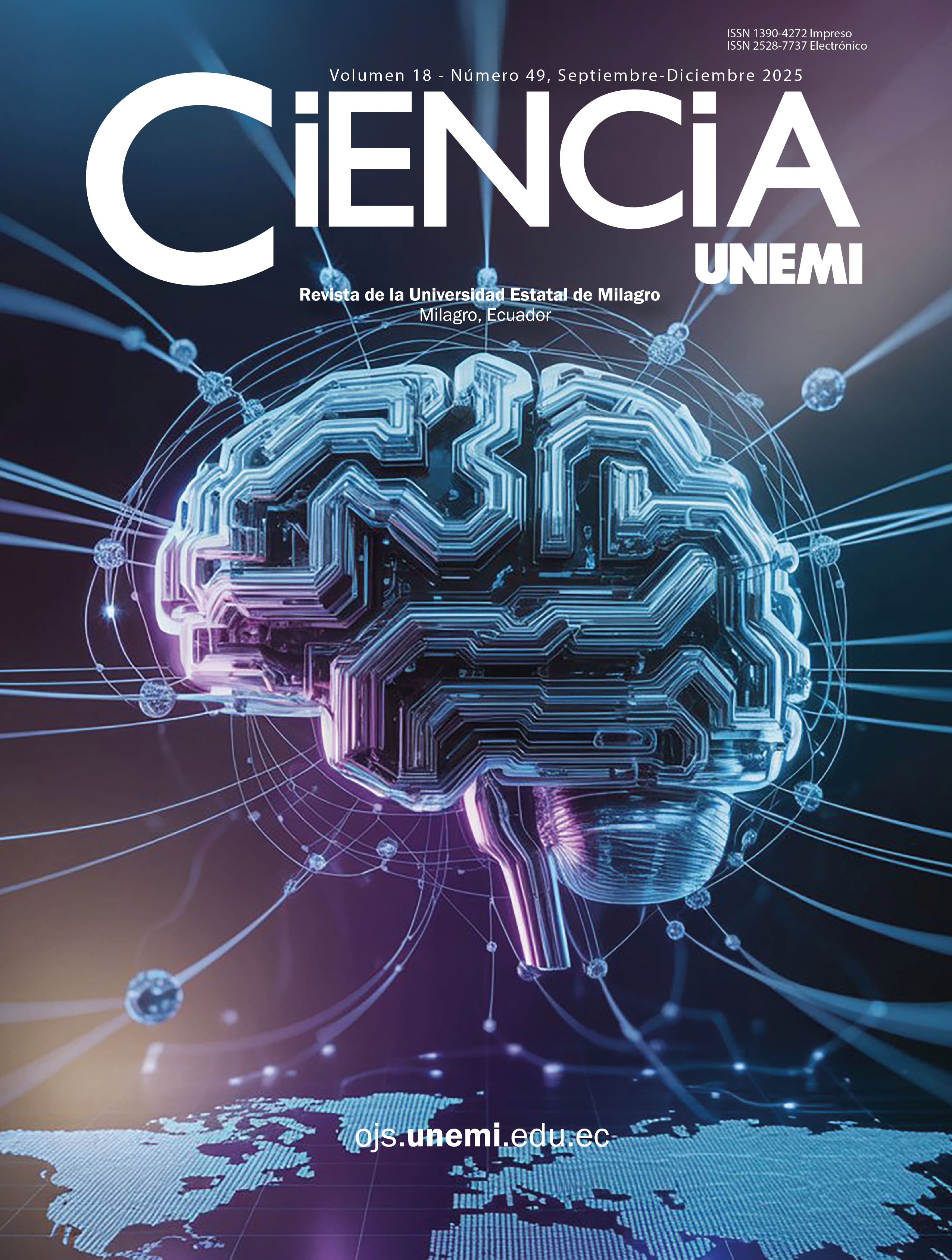Data science applied to solid waste management in Los Ríos-Ecuador
DOI:
https://doi.org/10.29076/issn.2528-7737vol18iss49.2025pp01-11pKeywords:
sustainable management, non-hazardous waste, segmentation, data mining, machine learningAbstract
Solid waste management is a challenge for cities and countries due to urbanization and population growth. This fact creates the need to explore options that facilitate analysis, such as Data Science. Therefore, this study applied techniques like Clustering to analyze the generation and management of non-hazardous solid waste, using the cantons of the Los Ríos province in Ecuador as a case study. Sixteen influential variables were identified through Chi-Square and ANOVA analysis, and Clustering algorithms (K-Means, DBSCAN, and Hierarchical Clustering) were applied to group cantons with similar characteristics. The results show that most cantons do not properly classify waste and dispose of it along with household waste. However, some cantons implement efficient practices such as composting and recycling. Therefore, the implementation of educational programs and specific strategies for each group of cantons is recommended, based on the identified patterns
Downloads
References
Assef, F., Steiner, M. T., y Lima, E. P. (2022). A review of Clustering techniques for waste management. Heliyon, 8(1). https://doi.org/10.1016/j.heliyon.2022.e08784
Boutsidis, C., Zouzias, A., Mahoney, M. W., y Drineas, P. (2014). Randomized Dimensionality Reduction for k-means Clustering. IEEE Trans. Inf. Theory, 61(2), 1-27. https://doi.org/10.48550/arXiv.1110.2897
Caruso, G., Gattone, S. A., Balzanella, A., y Di Battista, T. (2019). Cluster Analysis: An Application to a Real Mixed-Type Data Set. En C. Flaut, Š. Hošková-Mayerová, y D. Flaut, Models and Theories in Social Systems (pp. 525-533). Springer International Publishing. https://doi.org/10.1007/978-3-030-00084-4_27
Cheng, H., y Hu, Y. (2010). Municipal solid waste (MSW) as a renewable source of energy: Current and future practices in China. Bioresource Technology, 101(11), 3816-3824. https://doi.org/10.1016/j.biortech.2010.01.040
Dunkel, J., Dominguez, D., Borzdynski, Ó. G., y Sánchez, Á. (2022). Solid Waste Analysis Using Open-Access Socio-Economic Data. Sustainability, 14(3), 1233. https://doi.org/10.3390/su14031233
Ferronato, N., y Torretta, V. (2019). Waste Mismanagement in Developing Countries: A Review of Global Issues. International Journal of Environmental Research and Public Health, 16(6), 1060. https://doi.org/10.3390/ijerph16061060
Festa, D., Novellino, A., Hussain, E., Bateson, L., Casagli, N., Confuorto, P., . . . Raspini, F. (2023). Unsupervised detection of InSAR time series patterns based on PCA and K-means Clustering. International Journal of Applied Earth Observation and Geoinformation, 118, 103276. https://doi.org/10.1016/j.jag.2023.103276
Gondo, T. (2019). A hierarchical cluster-based segmentation analysis of potential solid waste management health hazards in urban Ethiopia. Jàmbá : Journal of Disaster Risk Studies, 11(2), 716. https://doi.org/10.4102/jamba.v11i2.716
Instituto Nacional de Estadística y Censos. (2024). Censos- Instituto Nacional de Estadística y Censos. Instituto Nacional de Estadística y Censos: https://www.ecuadorencifras.gob.ec/informacion-de-anos-anteriores-hogares/
Instituto Nacional de Estadísticas y Censo. (2022). Boletín Técnico Nacional. Censo Ecuador cuenta conmigo 2022: https://www.censoecuador.gob.ec/public/Boletin_Nacional.htm
Izquierdo-Horna, L., Kahhat, R., y Vázquez-Rowe, I. (2022). Reviewing the influence of sociocultural, environmental and economic variables to forecast municipal solid waste (MSW) generation. Sustainable Production and Consumption, 33, 809-819. https://doi.org/10.1016/j.spc.2022.08.008
Izquierdo-Horna, L., Zevallos, J., Damazo, M., y Yanayaco, D. (2021). Exploratory Data Analysis of Community Behavior Towards the Generation of Solid Waste Using K-Means and Social Indicators. International Journal of Sustainable Development and Planning, 6(5), 875-881. https://doi.org/10.18280/ijsdp.160508
Kaza, S., Yao, L., Bhada-Tata, P., y Van Woerden, F. (2018). What a Waste 2.0: A Global Snapshot of Solid Waste Management to 2050. World Bank Group. https://doi.org/https://doi.org/10.1596/978-1-4648-1329-0
Li, J., Guo, S., Ma, R., He, J., Zhang, X., Rui, D., . . . y Guo, H. (2024). Comparison of the effects of imputation methods for missing data in predictive modelling of cohort study datasets. BMC Medical Research Methodology, 24(1), 41. https://doi.org/10.1186/s12874-024-02173-x
Libório, M. P., da Silva Martinuci, O., Machado, A. M., Machado-Coelho, T. M., Laudares, S., y Bernardes, P. (2022). Principal component analysis applied to multidimensional social indicators longitudinal studies: limitations and possibilities. GeoJournal, 87(3), 1453–1468. https://doi.org/10.1007/s10708-020-10322-0
Ministerio del Ambiente. (2019). Dirección Provincial del Ambiente de Los Rios Informe de Rendición de cuenta 2019. https://www.ambiente.gob.ec/wp-content/uploads/downloads/2020/04/Los-R%C3%ADos_Fase-2.pdf
Ministerio del Ambiente, Agua y Transición Ecológica. (2020). Ecuador impulsa la gestión adecuada de residuos orgánicos en las ciudades. Ministerio del Ambiente, Agua y Transición Ecológica: https://www.ambiente.gob.ec/ecuador-impulsa-la-gestion-adecuada-de-residuos-organicos-en-las-ciudades/
Organización de las Naciones Unidas. (2018). Cómo la basura afecta al desarrollo de América Latina. Naciones Unidas: https://news.un.org/es/story/2018/10/1443562
Organización de las Naciones Unidas. (2022). Objetivos de desarrollo sostenible. 11 Ciudades y comunidades sostenibles: https://www.un.org/sustainabledevelopment/es/cities/
Sáez, A., Urdaneta, G., y Joheni, A. (2014). Manejo de residuos sólidos en América Latina y el Caribe. Omnia, 20(3), 121-135. https://www.redalyc.org/articulo.oa?id=73737091009
Singh, J., y Ordoñez, I. (2016). Resource recovery from post-consumer waste: Important lessons for the upcoming circular economy. Journal of Cleaner Production, 134, 342-353. https://doi.org/10.1016/j.jclepro.2015.12.020
Templ, M. (2023). Enhancing Precision in Large-Scale Data Analysis: An Innovative Robust Imputation Algorithm for Managing Outliers and Missing Values. Mathematics, 11(12), 2729. https://doi.org/10.3390/math11122729
Warintarawej, P., y Nillaor, P. (2023). Implementing data analysis based on the mixed Clustering technique for sustainable participatory waste management in a low-budget area. foresight, 25(1), 108 - 125. https://doi.org/10.1108/FS-09-2021-0179
Watson, K. B. (2014). Categorical Data Analysis. En A. Michalos, Encyclopedia of Quality of Life and Well-Being Research (pp. 601-604). Springer. https://doi.org/10.1007/978-94-007-0753-5_291
Whatley, M. (2022). One-Way ANOVA and the Chi-Square Test of Independence. En M. Whatley, Introduction to Quantitative Analysis for International Educators (pp. 57-74). Springer. https://doi.org/10.1007/978-3-030-93831-4_5
Downloads
Published
Issue
Section
License
Copyright (c) 2025 CIENCIA UNEMI

This work is licensed under a Creative Commons Attribution-NonCommercial-NoDerivatives 4.0 International License.
Authors can keep the copyright, granting the journal right of first publication. Alternatively, authors can transfer copyright to the journal, which allow authors non-commercial use of the work, including the right to place it in a file open access.
















